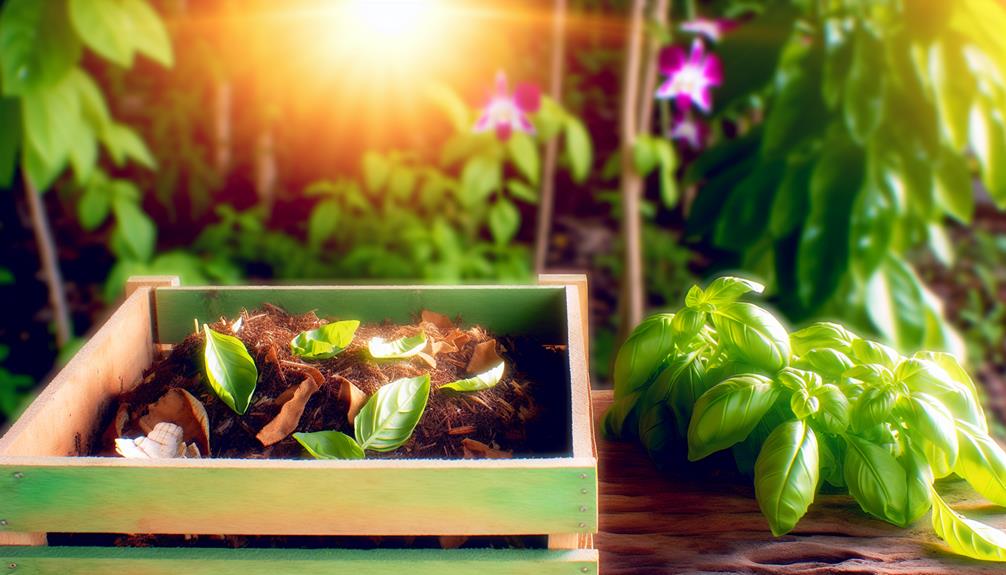

You can absolutely compost basil, and it’s a fantastic addition to your compost pile! Basil breaks down quickly, adding valuable nitrogen that boosts microbial activity and enriches the soil with essential minerals. To get the best results, chop the basil into smaller pieces and mix it with other compostable materials, balancing greens like basil with browns such as dried leaves.
Keep your compost moist but not soggy, and turn it regularly for effective decomposition. Adding basil to your compost not only aids in water retention but also enhances the overall compost diversity. Stick around to discover more amazing composting insights!
Composting basil brings multiple benefits to your garden. By adding basil to your compost, you’ll create a nutrient-rich soil additive that can greatly boost plant growth and health.
Additionally, incorporating basil enhances compost diversity, ensuring a more balanced and effective compost mix for all your gardening needs.
Adding composted basil to your garden soil can greatly enhance its nutrient profile, promoting healthier plant growth. Not only does composted basil enrich the soil with essential minerals, but it also improves overall soil structure, making it easier for roots to access nutrients and water.
Including basil in your compost mix introduces a variety of nutrients and organic matter, enriching the compost’s overall composition. By adding basil, you’re enhancing the diversity of your compost pile, which is important for creating a balanced and nutrient-rich soil additive.
The different textures and compounds in basil leaves contribute to a rich, fertile compost, fostering an environment where beneficial microbes thrive. This variety not only boosts the compost’s nutritional content but also improves its structure, making it more effective in supporting plant growth.
When you diversify your compost with basil and other kitchen scraps, you create a sense of belonging in your garden ecosystem, where every element plays a significant role in nurturing healthy, vibrant plants.
Also Read: Can You Compost Azuki Beans?
To compost basil effectively, start by chopping the leaves and stems into smaller pieces to speed up the decomposition process. This simple step helps basil integrate seamlessly into your compost pile.

For the best results, mix the chopped basil with a variety of other compostable materials, balancing green and brown content.
Also Read: Can You Compost Cotton Balls? The Shocking Truth Revealed!
You might think pesticide residue will stop you from composting basil, but it’s usually not a big issue if you wash the leaves first.
Another common misconception is that basil decomposes too slowly to be effective in compost, but in reality, it breaks down at a moderate rate and adds valuable nutrients.
Let’s clear up these misunderstandings and get your compost thriving!
Many people mistakenly believe that pesticide residues on basil will prevent it from being effectively composted. However, this isn’t entirely true. Pesticides do break down during the composting process, especially if you maintain a hot compost pile.
Here are some key points to keep in mind:
Surprisingly, basil decomposes quite quickly in a well-maintained compost pile, contrary to popular belief. You might think basil leaves would take forever to break down, but they actually disintegrate rapidly, especially when chopped up.
It’s essential to mix them well with other compost materials like browns (leaves, straw) to maintain a balanced pile. This balance helps create the perfect environment for microorganisms to thrive and speed up decomposition.
Also Read: Can You Compost Acorns?
Encountering problems while composting basil can be frustrating, but most issues have simple solutions.

If your compost pile isn’t breaking down as expected, it might be due to one of the following reasons:
How can you guarantee your basil composting efforts are as effective and efficient as possible?
Start by chopping the basil into smaller pieces; this speeds up decomposition. Balance your compost pile with green materials like basil and brown materials such as dry leaves or cardboard. Keep your pile moist but not soggy, ensuring it feels like a damp sponge. Turn the compost regularly to aerate it and distribute the materials evenly.
Involve your community by sharing tips and encouraging others to compost. Celebrate small wins together, like when your compost starts to break down or when you see the first signs of rich, dark compost forming.
Composting basil isn’t just possible—it’s incredibly beneficial for your garden! By adding basil to your compost, you’re enriching the soil with essential nutrients, boosting plant growth, and reducing waste.
Remember to chop the basil into smaller pieces, mix it with other compost materials, and maintain the right moisture and aeration. If you follow these best practices, you’ll create nutrient-rich compost that’ll make your garden thrive.
So, get started and watch your plants flourish!
